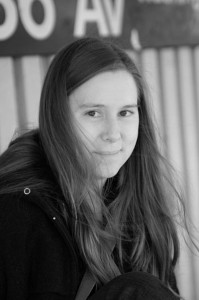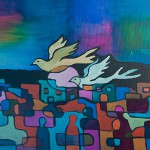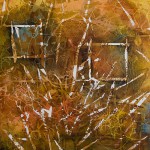Sara Roizen is a special treat for our Featured section. Not only is she an art therapist, but she’s also a very talented artist. That’s why we chose Sara to be featured and wanted to share her work as an art therapist and an artist to all of you. Sara is “inspiring others to create” in more ways than one.
You can learn more about Sara and why she decided to become an art therapist in the interview below. You can also check out her main site and her blog. And for those of you interested in pursuing a degree and/or a career in art therapy, she offers some great advice! We’ll start off with a gallery of her artwork…
Sara Roizen Featured Art Gallery
Featured Interview with Sara Roizen
1. Can you give the readers a bio about who you are, where you’re from, what you do, etc?
I am a painter and art therapist who recently graduated from Pratt Institute with a Masters in Creative Arts Therapy and Creativity Development. I have lived in many places (mostly on the East Coast) and currently live in Queens, NYC. After graduating I began working at Mount Sinai Kravis Children’s Hospital as an art therapist fellow. As an art therapist there I provide individual and group art therapy sessions to medically ill children and their families. I also maintain my own studio practice and paint all that I can in my free time!
2a. You recently graduated with a Master’s Degree in Art Therapy from the Pratt Institute (congratulations btw!). You also have a Certificate in Creative Arts Therapy and a BFA in Painting. Can you talk about how your Bachelors in Fine Arts degree helped you achieve a Master’s Degree from Pratt?
I received a BFA in Painting from Rhode Island School of Design. It was an amazing program and I really developed as an artist during my time there. I feel strongly that the skills I built as an artist there have been integral in the work I do as an art therapist. However, the program really focused on creating “gallery” artists, and even back then, I did not feel that this was the path that I wanted to follow. As much as I enjoyed showing my work, I felt that something was lacking. A few years after I graduated from college I found myself in New York City, and looking for a program where I could explore art therapy. I wanted to have a solid foundation in the field before I went on to graduate school for art therapy, and figured this would be a good way to make sure that this was the path for me. I found the Certificate Program at the New School and continued to work full time while taking evening classes there. It took me a little over 2 years to complete the certificate and the internship, and every minute was worth it! In addition to art therapy, I minored in music therapy – which gave me a window into another modality besides art. After the program I knew without a doubt that I wanted to pursue art therapy on a graduate level. When I found Pratt Institute I felt like I had come home. Everything about Pratt’s art therapy program aligned with what I was looking for.
2b. Can you offer advice for other people that are interested in pursuing a degree, and a career, in Art Therapy? (ie – suggested steps to take, how to find a good program, how you found your job, etc.)
It is very helpful to have a background in either art or psychology before going on to a graduate program. A certain amount of credits in both areas are required for all graduate programs. I had more than enough art credits, but needed to take some more psychology courses before beginning graduate school. As far as finding a good program I largely went on two things: word of mouth and my instinct. Many people had raved about Pratt’s program, and when I went there for the first time I had a gut feeling that it was the right program for me. I acquired my job at the hospital after interning there for 9 months (as part of my graduate program). They offered me a fellowship there and I was happy to take it! Some people find jobs through internships, and other ways might be through traditional job “hunting” techniques such as the internet etc…community forums (like NYCCAT), and through networking with others in the field or related fields. Also keep in mind that when looking for a job, many jobs might not be called “art therapist” but might be more along the lines of “activity coordinator” or “recreational therapist.” I have known many people who have taken these job titles and have practiced art therapy (just check with the specific institution first).
3a. Can you talk about your work as an art therapist and what you’re doing to help children? Are there any activities you can share that have been more effective than others?
When it comes to doing art therapy with children the rule is that there are no rules as far as which techniques/materials might work with an individual. I am constantly reaching into my art therapy “toolbox” and pulling out a different approach or medium to try depending on what I am sensing from the individual child and what their needs are. That being said, there are always things to keep in mind when presenting art to a child or adult. Much literature and discussion has been devoted to this area, and it’s too extensive to get into here, however I rely on my training as an art therapist everyday to help me make informed decisions about the art therapy that I do.
3b. What made you decide to become an art therapist?
I have always been drawn to art and have been drawing and painting since I was a little girl and in college I studied painting. After graduating I continued to paint, while working various jobs (unrelated to art). I began to feel that something was lacking in my life and decided to begin volunteering here in the city during my free time. While volunteering in various settings I began to realize that the missing piece in my life was a genuine connection to working with and helping others. It seemed so natural to then combine my passion for art with my passion for people, and I began to explore the field of art therapy.
4. Describe yourself in 5 words.
Spontaneous, colorful, funny, dedicated, sensitive.
5. If 3 of your best friends were hanging out with you, what’s one thing they’d all jokingly make fun of you for?
I’m a bit obsessive about checking certain things – such as the gas stove and the locks on the door. If my friends are with me I make them check for me before we leave the apartment!
6. What are you passionate about? This can be work-related, personal, whatever you would like to share.
My passions and the field of art therapy are aligned. I am passionate about helping people, and about making art and creativity. I feel very lucky that my passions align with my chosen field!
7. Is art, or the process of creating art, therapeutic for you in any way? If so, could you provide a recent example?
I was drawn to the field of art therapy specifically because I have seen firsthand how art has been a healing experience in my own life. It made sense – if creating art helped me so much, didn’t it make sense that it could also help heal others?
8. How has art influenced your perception of life?
Art is everywhere we look. Everything manmade was first dreamed of by an artist. I think that my pursuit of art helps me to see the beautiful little details in life…from a tiny wildflower on a mountain to the beauty to be found in a cluttered city street corner.
9. What are some other things or people that inspire/motivate you?
Music and nature are great inspirations to me. I almost never paint without music on! I love to read up on art therapy books…some of my favorite authors in the field include Cathy Malchiodi, Shaun McNiff, Bruce Moon, Catherine Moon, and Pat Allen.
10. Do you believe creativity is an innate quality? Please explain.
There’s a wonderful quote by Picasso: “All children are artists. The problem is how to remain an artist once he grows up.” I believe that all people possess an innate creativity. Sometimes during our life this innate creativity is discouraged. I cannot tell you how many adults have told me that they cannot “even draw a stick figure.” Part of my job as an art therapist is to gently challenge these deeply held beliefs and help guide people back to their child-like self in terms of creativity.
11. What are some wise words or advice you would like to offer people reading this?
Trust yourself and follow your instinct…whether it’s in pursuing a path in art therapy, or anything else you do. It took me a while to find my chosen path, but when I did I knew it right away.
12. You have been selected to go on an all expenses paid vacation with 3 people you’ve never met (dead or alive). Who is going on vacation with you and where?
As an adoptee, my ultimate dream is to meet my birth mother. If I could pick any 3 people I’d pick my birth mother, my birth father, and a biological sibling – and go to Japan, as that is where my birth mother’s mother is from.
SPEED ROUND – Quick questions with quick answers. Ready, go!
What is your favorite food?
I have so many! But one of my favorites (not so healthy) is chicken fingers.
If you could be one animal, which one would you be?
Definitely some kind of bird (maybe a hawk) so that I could fly!
If you could have one superpower, what would it be?
Similar to above…I’d like to fly…
FINAL QUESTION
Where on the world wide web can we learn more about you?
www.sararoizen.com
www.arttherapyspot.com/















Hi Sara,
Your work is beautiful. I can imagine that your healing presence and your art therapy skills at the hospital are much appreciated. I have an art history, film, and graphic design background, but I’ve always been interested in pursuing art therapy. Keep up the good work!
Ginny
Sara,
I worked with you years ago in Memphis when we were camp counselors in ’99. What a surprise to see you featured on this site!Congratulations! I’ve been subscribing to the Art Therapy Blog for sometime now and am working with autistic children. Art Therapy works very well and I have been successful in incorporating art of all kinds into the classroom. Your art is absolutely incredible; I believe the best way to connect with autistic children is through the expression of art. All the best and continued wishes on your successes-
Marc King, MSW
Thank u Sara for an inspiring interview. I am an artist and recently achieved my Bachelor of Visual Arts & Design and didnt stop working with people with intellectual disabilities. Recently I have been asked to assist in running art group twice a week. I recently booked in to do the art therapy workshop and cant wait. I agree with you when you say helping people fulfilling. I love art making, but I find the art world so shallow, even though I have made some good friends. So my aim is to marry art with my work with helping people. Desma
Sara…I found your interview inspiring. Our daughter, who is 16, has recently said that she would like to pursue becoming an art therapist. This was no surprise to us! She is a very gifted artist and writer. Through her therapy (regarding her adoption), she realized that she thought she might want to be a therapist. (her therapist is an amazing person) We are trying to help her pursue this. I am googling “art therapy counselor”, “art therapy summer camps” and anything else I can think of. We are hoping that she could volunteer at an art therapy camp to see “first hand” how it works. Or, to send her to an “art therapy camp” for those who want to pursue art therapy in college. We are basically trying to find anything that would give her experience. Would love any suggestions and/or ideas! Tonya